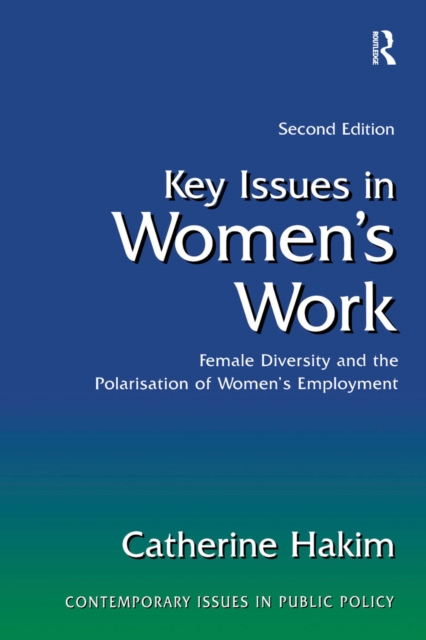
Key Issues in Women's Work : Female Diversity and the Polarisation of Women's Employment PDF
by Catherine Hakim
Part of the Contemporary Issues in Public Policy series
Description
Women's employment is one of the most widely-discussed and often-misunderstood issues of modern society. Are women today oppressed, or do they have the best of both worlds? Do women have to go out to work to gain equality with men, or do they already do more than their share of domestic work, caring work and voluntary work as well as work in the informal economy? Do women seek careers on the same terms as men, or are they content to be dependent wives or secondary earners taking jobs on a short-term basis? How important is job segregation in explaining the 20% pay gap between men and women? Have equal opportunities laws had any real impact? Are women in Europe lagging behind, or are they at the forefront of developments in modern societies? This new updated edition of Catherine Hakim's classic text addresses all the key issues currently debated in relation to women's work - in the domestic sphere, as well as paid employment.
Dr Hakim tests the power of patriarchy theory and preference theory against economic theories. Sex discrimination, work-life balance, part-time work, flexible hours, homeworking, career patterns across the life cycle, labour mobility, labour turnover, the returns to education, occupational segregation, the pay gap, the glass ceiling, and the impact of European Union policies are all considered. Analysis of historical developments over the twentieth century, based on censuses, is complemented by case studies of people working in occupations undergoing dramatic change. Throughout the book, comparisons are drawn between the USA, Britain, other European countries, Canada, Australia, and also China, Japan and other Far Eastern societies.
The analysis draws on sociology, economics, psychology, labour law, history and social anthropology to conclude that the diversity of women's life goals and lifestyle preferences is increasing. This explains the growing polarisation of women's employment and many contradictory recent research results.
Information
-
Download - Immediately Available
- Format:PDF
- Pages:280 pages
- Publisher:Taylor and Francis
- Publication Date:17/09/2016
- Category:
- ISBN:9781135310899
Other Formats
- EPUB from £42.92
Information
-
Download - Immediately Available
- Format:PDF
- Pages:280 pages
- Publisher:Taylor and Francis
- Publication Date:17/09/2016
- Category:
- ISBN:9781135310899










